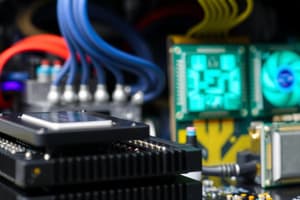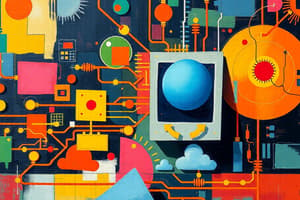Podcast
Questions and Answers
Which of the following is NOT a challenge of ICT?
Which of the following is NOT a challenge of ICT?
- Privacy concerns
- Digitial divide
- Cybersecurity threats
- Social development (correct)
The digital divide refers to the equal access to technology and internet services for all individuals.
The digital divide refers to the equal access to technology and internet services for all individuals.
False (B)
What are two benefits of ICT?
What are two benefits of ICT?
Enhanced communication, improved efficiency
The integration of new technologies like AI and ______ is key to the future of ICT.
The integration of new technologies like AI and ______ is key to the future of ICT.
Match the following challenges of ICT with their descriptions:
Match the following challenges of ICT with their descriptions:
Which of the following is a key component of ICT?
Which of the following is a key component of ICT?
Telecommunications refers exclusively to the use of the internet.
Telecommunications refers exclusively to the use of the internet.
What role does ICT play in healthcare?
What role does ICT play in healthcare?
The ______ of connected devices that communicate and exchange data is known as the Internet of Things.
The ______ of connected devices that communicate and exchange data is known as the Internet of Things.
Match the following ICT applications with their benefits:
Match the following ICT applications with their benefits:
What is cloud computing primarily associated with?
What is cloud computing primarily associated with?
Big Data involves the analysis of small datasets to gain insights.
Big Data involves the analysis of small datasets to gain insights.
Name one trend in ICT and briefly describe it.
Name one trend in ICT and briefly describe it.
Flashcards
Mobile Technology
Mobile Technology
The widespread use of smartphones and other mobile devices for constant communication.
Cybersecurity
Cybersecurity
Protecting computer systems and data from cyberattacks.
Digital Divide
Digital Divide
The unequal access to technology and the internet.
ICT Benefits (Economic Growth)
ICT Benefits (Economic Growth)
Signup and view all the flashcards
ICT Challenges (Privacy Concerns)
ICT Challenges (Privacy Concerns)
Signup and view all the flashcards
ICT Components
ICT Components
Signup and view all the flashcards
ICT Hardware
ICT Hardware
Signup and view all the flashcards
ICT Software
ICT Software
Signup and view all the flashcards
ICT Data
ICT Data
Signup and view all the flashcards
Cloud Computing
Cloud Computing
Signup and view all the flashcards
Big Data
Big Data
Signup and view all the flashcards
Artificial Intelligence (AI)
Artificial Intelligence (AI)
Signup and view all the flashcards
Internet of Things (IoT)
Internet of Things (IoT)
Signup and view all the flashcards
Study Notes
Introduction to ICT
- Information and Communications Technology (ICT) encompasses all forms of communication, technology for information gathering, storage, processing, retrieval, and distribution.
- It spans diverse fields like computers, networks, software, telecommunications, and the internet.
- ICT is a crucial driver of economic and social development, playing a vital role in connecting individuals, businesses, and governments.
Key Components of ICT
- Hardware: Physical components like computers, servers, routers, and storage devices.
- Software: Programs and applications that control and manage the hardware. This includes operating systems, applications, and databases.
- Data: The raw material of ICT. It encompasses text, images, audio, and video that are collected, processed, and transmitted.
- Networks: Systems enabling the communication and sharing of data among different devices and locations. This includes local area networks (LANs), wide area networks (WANs), and the internet.
- Telecommunications: Technologies enabling the transmission of data over long distances, using various mediums like phone lines, fiber optic cables, and satellites.
ICT Applications
- Business: ICT enhances efficiency and productivity through automation, communication tools, and online transactions. It allows for better management of resources and data analysis.
- Education: ICT offers interactive learning experiences, access to online courses and resources, and facilitates collaboration between students and educators.
- Healthcare: ICT streamlines patient records, enables remote consultations, supports medical research, and allows for efficient management of healthcare resources.
- Government: ICT facilitates public services delivery, citizen engagement, and administrative efficiency.
- Personal Life: ICT connects individuals with friends and family, provides entertainment, and facilitates communication and information access.
Trends in ICT
- Cloud Computing: The delivery of computing services over the internet. This allows for flexible resource allocation and cost savings.
- Big Data: The collection and analysis of large datasets to extract valuable insights.
- Artificial Intelligence (AI): The development of intelligent machines capable of performing tasks that typically require human intelligence.
- Internet of Things (IoT): The network of connected devices that communicate and exchange data.
- Mobile Technology: The proliferation of smartphones and other mobile devices enabling ubiquitous connectivity.
- Cybersecurity: Protecting digital systems and data from threats like hacking, viruses, and data breaches.
Importance of ICT
- Enhanced communication: Enables instant and global communication, fostering collaboration and understanding.
- Improved efficiency: Streamlines processes in various sectors, increasing productivity.
- Increased access to information: Provides access to vast repositories of knowledge, empowering individuals and communities.
- Economic growth: Drives innovation, creates new industries, and fosters entrepreneurship.
- Social development: Facilitates social inclusion, democratic participation, and cultural exchange.
Challenges of ICT
- Digital divide: Unequal access to technology and internet services based on geographical location, socioeconomic status, or other factors.
- Cybersecurity threats: The risk of data breaches, hacking, and malware attacks.
- Privacy concerns: The protection of personal data and the ethical use of information.
- Data overload: The challenge of managing and processing increasing amounts of data.
- Maintaining data integrity and security: Protecting data from unauthorized access and ensuring data accuracy.
- Maintaining digital literacy: Ensuring individuals have the skills to effectively use and manage ICT tools.
Future Outlook of ICT
- Continued evolution in speed, capacity, and accessibility.
- Integration of new technologies like AI and IoT.
- Addressing the challenges of digital inequality and cybersecurity.
- Ethical development and implementation of ICT solutions to promote fairness and social good.
- Focus on developing sustainable and responsible practices.
- Creation of more user-friendly and intuitive digital experiences.
Studying That Suits You
Use AI to generate personalized quizzes and flashcards to suit your learning preferences.




